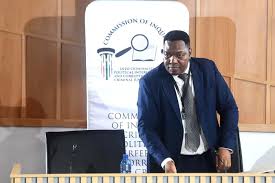
South Africa’s National Police Commissioner Fannie Masemola has accused his deputy of attempting to exert sweeping control over criminal investigations shortly after his appointment, raising concerns about political interference and obstruction of justice within the country’s police service.
Testifying before the Madlanga Commission of Inquiry in Pretoria on Tuesday, Masemola said Deputy National Police Commissioner for Crime Detection, Shadrack Sibiya, made several controversial moves soon after assuming office in June 2023.
One of the first points of conflict, Masemola explained, was Sibiya’s request to take oversight of the South African Police Service’s (SAPS) cold case unit — a division that traditionally reports directly to the national commissioner. Describing the request as unusual, Masemola said he warned Sibiya against overreach.
“You have just been appointed, you have this elephant that you must deal with.
So you can’t be looking for a piece of hair from the tail of the elephant,” he told the commission.
The second dispute centred on Crime Intelligence head Dumisani Khumalo. Sibiya argued that counter-intelligence dockets should be handed over to detectives, but Masemola objected, insisting the files were too sensitive to be shared.
A third flashpoint involved the political killings task team (PKTT), whose disbandment by Police Minister Senzo Mchunu has been at the heart of allegations of political meddling. Khumalo, according to Masemola, maintained that the PKTT was “a well-oiled machine” and required minimal oversight.
Masemola further claimed that Sibiya bypassed the chain of command by reporting directly to Mchunu. Allegations suggest the two collaborated to dismantle the PKTT in an effort to shield criminal syndicates, including associates of businessman Vusimuzi “Cat” Matlala, who was recently denied bail in an attempted murder case.
Following the lunch adjournment, Masemola told the commission he believed Sibiya’s ultimate goal was to gain full control over all police case dockets. “If you have control of the whole terrain of dockets, then it means there is nothing that will fall outside that you won’t know, and you’ll be able to manage whatever you want,” he said.
Sibiya is also under investigation for allegedly ordering that PKTT dockets be withdrawn and shelved at SAPS headquarters — a move prosecutors say obstructed investigations and amounted to defeating the ends of justice. Cellphone records, Masemola added, suggest Sibiya was acting on ministerial directives to protect cartel members under investigation.
The inquiry continues as pressure mounts on SAPS leadership to address concerns about internal corruption and political interference within its ranks.



